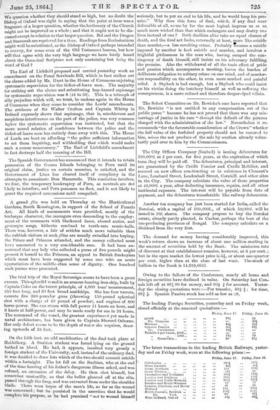On the 15th inst. an odd modification of the duel
took place at Heidelberg. A Suabian student was found lying on the ground bathed in blood. He had, it appears, insulted very grossly a foreign student of the University, and, instead of the ordinary duel, it was decided to draw lots which of the two should commit suicide within a fortnight The lot fell on the Suabian, who at the end of the time hearing of his father's dangerous illness asked, and was refused, an extension of the delay. He then shot himself, but somewhat unsteadily, so that the bullet glanced off at the ribs, passed through the lung, and was extracted from under the shoulder blade. There were hopes of the manS life, so far as the wound was concerned ; but he persisted in the assertion that he would complete his purpose, as he had promised "not to wound himself seriously, but to put an end to his life, and he would keep his pro- mise." Why does this form of duel, which, if any duel were defensible at all, seems by far the most logical, impress us as so, much more wicked than that which endangers and may destry two lives instead of one ? Both duellists alike take an equal chance of death, and the final act looks, externally at least, more like suicide than murder,—a less revolting crime. Probably tecause a suicide imposed by another is both suicide and murder, and involves a frightful pitilessness in the man who, having escaped the con- tingency of death himself, still insists on his adversary fulfilling the promise. Also the withdrawal of all the tonic effect of pride and passion which accompanies a meeting, leaves the burden of deliberate obligation to solitary crime on one mind, and of murder- ous responsibility on the other, in even more marked and painful relief. A Shylock is bad enough, but a Shylock who could insist on his victim doing the butchery himself as well as suffering the consequences, is a more refined and therefore deeper-dyed villain.






























 Previous page
Previous page